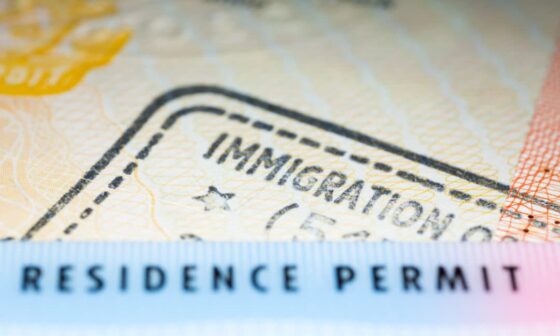I recall being worried about traveling abroad, worrying about the immigration process, and what rights I would have if stopped by an official. Many travelers are concerned about whether immigration officers can arrest them and, if so, what their rights are. This article will answer these issues by providing a detailed look at your rights and obligations during immigration contacts, supported by expert insights and real-world experience.
Can Immigration Officers Arrest?
Yes, immigration officers have the authority to arrest someone under specific conditions. They have the authority to detain anyone they believe is in violation of immigration rules or poses a threat to national security. This authority is granted to protect the integrity of a country’s immigration system and to enforce compliance with immigration laws.
According to the United States Immigration and Customs Enforcement (ICE), officers can arrest anyone without a warrant if they have “reason to believe” they are in violation of immigration laws. Other countries’ immigration authorities, such as the United Kingdom’s Home Office and Canada’s Immigration and Refugee Board, reflect this extensive authority.
When Can Immigration Officers Arrest?

#1. Violation of Immigration Laws
Immigration officers have the authority to arrest people who violate immigration laws. This includes overstaying a visa, working without permission, and entering the nation illegally.
According to a Pew Research Centre analysis, visa overstays make for a large proportion of undocumented immigrants in the United States, emphasizing the need to adhere to visa rules.
#2. Criminal Activities
If someone is suspected of engaging in criminal activity, immigration officers have the authority to arrest them. Drug trafficking, fraud, and violent crimes are also closely examined.
#3. Suspicious Behaviour
Officers can arrest those who exhibit suspicious behavior that could suggest a threat to national security or public safety. This involves possessing counterfeit documents or phony identities.
#4. Warrant-based arrests
Immigration officers may arrest people based on warrants issued by a judge or an immigration authority. These warrants are usually issued when there is strong proof of a violation.
#5. Random checks
At airports, border crossings, and other points of entry, immigration officers occasionally perform random checks. If they find any abnormalities or infractions during these checks, they have the authority to arrest anybody.
What Are Your Rights During an Immigration Encounter?
Understanding your rights during an immigration encounter is critical to defending yourself and ensuring a fair procedure. Here are some important rights you should be aware of.
Advertisements
#1. Right to remain silent
You have the right to remain silent and not answer any inquiries that could incriminate you. This is a fundamental right that you can exercise pleasantly and respectfully. You can simply state, “I choose to remain silent,” to avoid saying anything that could be used against you later.
#2. Right to legal representation
You have the right to legal representation. If you are arrested or detained, you may ask to talk with a lawyer before answering any questions. Legal representation can give you vital advice, help you comprehend the charges against you, and walk you through the legal process.
#3. Right to Contact Your Embassy
As a Nigerian citizen, you can seek assistance from the Nigerian embassy or consulate. They can offer assistance, safeguard your rights, and facilitate communication with your family. In addition, the embassy can provide a list of immigration lawyers.
#4. Right to Hearing
If you are detained, you are entitled to a hearing before an immigration judge. This hearing allows you to explain your case, contest the reasons for your detention, and fight against deportation. The judge will consider the evidence and reach a ruling based on the merits of your case.
#5. Right to Fair Treatment
During the contact, you have the right to fair and humane treatment. This means that immigration officers cannot subject you to mistreatment, abuse, or cruel conditions. You must report any sort of mistreatment to your lawyer or the legal authorities as soon as possible.
Additional rights:
Advertisements
- Right to Translation Services: If you do not understand the language spoken, you have the right to request translation services to ensure that you completely grasp the proceedings and communications.
- Right to access your case file: You have the right to review the documents and evidence used against you in your immigration case. This permits you to plan an informed defense.
- Right to Medical Care: If you need medical attention while in custody, you have the right to get it.
Understanding and asserting your rights during an immigration meeting can have a big impact on the result of your case. It is critical to stay informed, maintain cool, and seek proper legal and consular assistance as needed.

What Should You Do If Interpol Arrests You?
Being arrested by immigration officers can be a frightening experience, but understanding how to deal with the situation can make a big difference. Here are some practical steps to follow if you are arrested by immigration officers:
#1. Keep Calm
It is critical to maintain composure and calm. Panicking might worsen the problem and create misunderstandings. Take deep breaths and focus on the actions you must take to safeguard your rights and well-being.
#2. Do Not Resist Arrest
Resisting arrest can result in further charges and complicate the issue. Cooperate with the officers and obey their directions. It’s vital to understand that resisting arrest can be interpreted as an admission of guilt or raise additional suspicions.
#3. Request Legal Representation
Contact a lawyer as soon as feasible. Legal counsel can provide you with helpful advice while also protecting your rights. A lawyer can also assist you in understanding the charges against you and navigating the legal system.
#4. Contact Your Embassy
Tell the officers that you want to contact your embassy. The Nigerian embassy can provide assistance and assure fair treatment. They can also give you a list of lawyers, facilitate communication with your family, and monitor your case.
#5. Document Everything
Keep a note of the incident, including the officers’ names, badge numbers, and any statements made. This material may be important in your legal defense. If possible, take note of the time and location of the arrest, as well as any other pertinent information that may help your case.
During a trip to the United States, a buddy of mine was detained by immigration officers because of a misunderstanding over his visa status. He kept calm, asked for a lawyer, and contacted the Nigerian embassy. His legal representation and the embassy’s assistance helped to clear the problem, and he was released without prosecution. This incident emphasized the necessity of understanding your rights and being prepared.
Additional Tip:
- Know Your Rights: Educate yourself on your rights as an immigrant. Understanding your rights can help you make educated decisions during an arrest.
- Be kind and respectful. Maintaining a respectful demeanor can assist in de-escalating the issue. Being nice does not imply admitting guilt, but it can improve the encounter.
- Don’t Sign Documents: Never sign any documents without first talking with your lawyer. Certain documents may waive your rights or acknowledge guilt.
- Stay Informed: Keep up to date on your host country’s immigration rules and policies. This knowledge can be extremely useful if you ever face an immigration arrest.
Understanding these processes and preparing yourself mentally and practically will help you deal with the stressful experience of being arrested by immigration officers more efficiently.
Legal Framework for Immigration Arrests
Immigration arrests are subject to a variety of rules and regulations aimed at protecting both national security and individual rights. Here are some important legal frameworks:
#1. The Immigration and Nationality Act (INA)
In the United States, the INA serves as the legal foundation for immigration enforcement, including the authority of immigration officers to arrest persons accused of breaking immigration rules.
#2. European Union Regulations
In the European Union, legislation such as the Schengen Borders Code defines immigration officers’ obligations and travelers’ rights during border checks.
#3. The Canadian Immigration and Refugee Protection Act (IRPA)
The Immigration and Refugee Protection Act of Canada controls immigration enforcement and includes provisions for the arrest and detention of anyone suspected of breaking immigration regulations.
#4. Nigerian Immigration Act
The Nigerian Immigration Act defines the powers of Nigerian immigration officers and the rights of individuals during immigration contacts.
Key Takeaways
- Immigration officers have the authority to arrest anyone under specific conditions.
- Understanding your rights during an immigration interaction is critical.
- If detained, stay cool and cooperative.
- Seek legal counsel and call your embassy immediately.
- Having the right information will help you negotiate the problem more effectively.
Conclusion
Understanding your rights and obligations during immigration meetings is critical for defending yourself and receiving fair treatment. Knowing if immigration officers can arrest you and under what conditions will allow you to approach these situations with confidence and preparedness. Have you or someone you know ever had an immigration issue? How did you manage it? Please share your experiences and tips in the comments section below.
Related Articles
- Can Immigration See Expunged Records? Expert Insights on Immigration Background Checks
- Can Immigration Cancel Permanent Residence? What Permanent Residents Need to Know
- Can Immigration Stop You at an Airport? A Guide for International Travelers
- Looking to Japa? Here’s the Best Country for Nigerian Migrants
- Can Immigration Sponsorship Be Revoked? What Immigrants and Sponsors Need to Know
References
Advertisements





